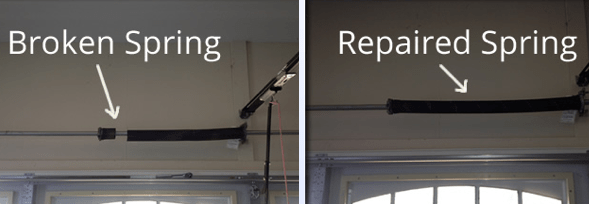Garage doors play a significant role in providing security and convenience to homeowners. A crucial component of a garage door system is the garage door spring, which supports the door’s weight and facilitates its smooth movement. However, garage door springs are subject to wear and tear, and eventually, they may break, causing inconvenience and potential safety hazards. In this article, we will delve into the common reasons what causes garage door spring to break and explore ways to prevent such incidents.

Understanding Garage Door Springs:
Before delving into garage door spring breakage causes, grasp the two main spring types: extension and torsion springs.
- Extension Springs: Typically found in older garage door systems, extension springs are located on either side of the door and stretch to support the door’s weight as it opens and closes.
- Torsion Springs: Commonly used in modern garage doors, torsion springs are mounted above the door and wind and unwind to provide the necessary lifting force.
Causes of Garage Door Spring Breakage:
- Normal Wear and Tear: Garage door springs are subject to constant tension and stress, which can cause wear over time. As they cycle through frequent use, the metal in the springs can weaken, leading to eventual breakage. Normal wear and tear are the most common cause of garage door spring failure.
- Rust and Corrosion: Garage door springs face weather and environmental factors, leading to rust and corrosion. Rust weakens the structural integrity of the springs, making them more susceptible to breakage.
- Lack of Maintenance: Regular maintenance is crucial to the longevity of garage door springs. Neglecting lubrication increases friction, accelerates wear, and raises the risk of spring failure.
- Incorrect Spring Size: Choose the right spring size to avoid strain and premature failure; match it with your garage door.
Preventing Garage Door Spring Breakage:
- Regular Maintenance: Perform regular maintenance on your garage door system, including lubricating the springs, tracks, and other moving components. Schedule professional inspections to ensure that all parts are in good condition.
- Use High-Quality Springs: Invest in high-quality garage door springs from reputable manufacturers. Quality springs are more durable and less prone to breakage.
- Balance and Tension Adjustment: Hire a professional to adjust and calibrate garage door springs for proper balance and tension.
Conclusion:
Understanding what causes of garage door spring to break is essential for homeowners seeking to maintain a functional and safe garage door system. Normal wear and tear, rust and corrosion, lack of maintenance, and incorrect spring size are common factors contributing to spring failure. To prevent such incidents, prioritize regular maintenance, use high-quality springs, and ensure proper balance and tension adjustments.
Garage door spring replacement is hazardous; trained professionals should handle it to prevent injuries. Be proactive, seek assistance, extend spring lifespan for a reliable system.



Leave a Reply